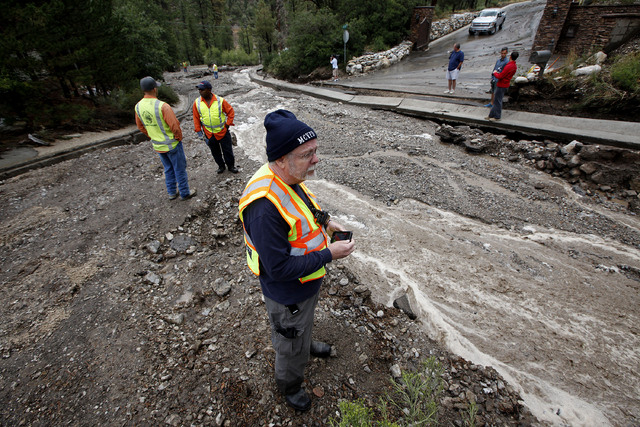Disaster declared for Mount Charleston flood area

Clark County commissioners on Wednesday approved a disaster declaration for the flooded Mount Charleston area — which suffered more than $2 million in damage — that will make the county eligible to receive emergency assistance funding.
They also said they were willing to maintain a proposed federal flood diversion project to protect the Rainbow subdivision if the the federal government builds it and if the state assumes the legal liability for the project.
The project and the failure of the county and federal agencies to reach an agreement before monsoon season has come under scrutiny after the flooding, which damaged some two dozen properties, filling several homes with mud and debris.
After Gov. Brian Sandoval toured the area Friday, he said he wants to help as needed, leaving the door open to the state possibly assuming liability. County, state and federal officials have discussed the ongoing issue, but no formal deal has been reached.
Commissioner Larry Brown, whose district encompasses Mount Charleston, on Wednesday defended the county’s response to the flood and its investments in the mountain, adding that county taxpayers cannot assume liability for a project built on federal land in which it has had no input.
“It’s very easy to go up there and tour the site and bring the media and say you’re going to solve things,” Brown said, taking an apparent dig at Sandoval’s tour of the flooded mountain community, which had extensive media coverage.
County officials made the emergency declaration to be eligible for recouping federal and state dollars for repair and overtime costs. County officials estimated Wednesday that public infrastructure damage is about $1.4 million, including roads and water lines.
The assessment also found about $849,000 in damage to 10 homes, seven that already have flood insurance. The damage falls short of the threshold to be eligible for low-interest loans through the federal government. However, state emergency management officials will look for federal options for the uninsured.
Brown later Wednesday told reporters that he believes Sandoval’s involvement will help the government agencies reach an agreement.
“I think we’ll get there,” Brown said.
He stressed that the county is willing to work with federal agencies and the state in reaching a deal.
“We’re at the table,” Brown said. “We’re partnering. We want to help, but we can’t do it alone.”
Area residents have criticized county officials for not reaching a deal with the U.S. Army Corps of Engineers that would have put a 1,700-foot earthen berm to help divert floodwater away from the subdivision. The corps was prepared to build the project in June before the monsoon season. Under that proposal, federal funding would cover the $880,000 cost of designing and building the berm.
But county officials were concerned because the propossal for the berm, located on U.S. Forest Service land, had a requirement to assume the legal liability for the structure. The county was first approached with the concept in March, and in May found out about the liability requirement after verbally agreeing to maintain the structure.
County officials, however, are willing to maintain and repair the temporary structure during its lifespan of about seven to 10 years.
Brown said the county’s estimated cost of that would be at least $1 million, more than the federal government’s cost of constructing the berm. Brown also said that at a meeting a couple of weeks ago that state officials were unwilling to assume the liability either.
Corps officials have said federal regulations require a local or state agency to assume the responsibilities and liability after the federal agency builds a project.
At the meeting, Brown defended the county.
“The finger pointing has all been directed at the county, and that’s absolutely not fair,” he said.
Mount Charleston, not just the Rainbow subdivision, has a lack of vegetation following the Carpenter 1 Fire that destroyed nearly 28,000 acres, making the area more prone to mudslides. Forest Service officials have estimated it could take at least five to seven years for some of the vegetation to grow back.
In a statement, Sandoval said it’s a “dangerous situation” for Mount Charleston residents that needs immediate attention.
“Although the primary responsibility for protecting these innocent residents from further harm lies with Clark County and the federal government, the state stands ready to assist and has already engaged with County and federal officials to find a solution that protects all the affected parties,” Sandoval said. “The state will continue to foster discussions on potential solutions to this public safety concern.”
Contact Ben Botkin at bbotkin@reviewjournal.com or 702-387-2904. Find him on Twitter: @BenBotkin1.